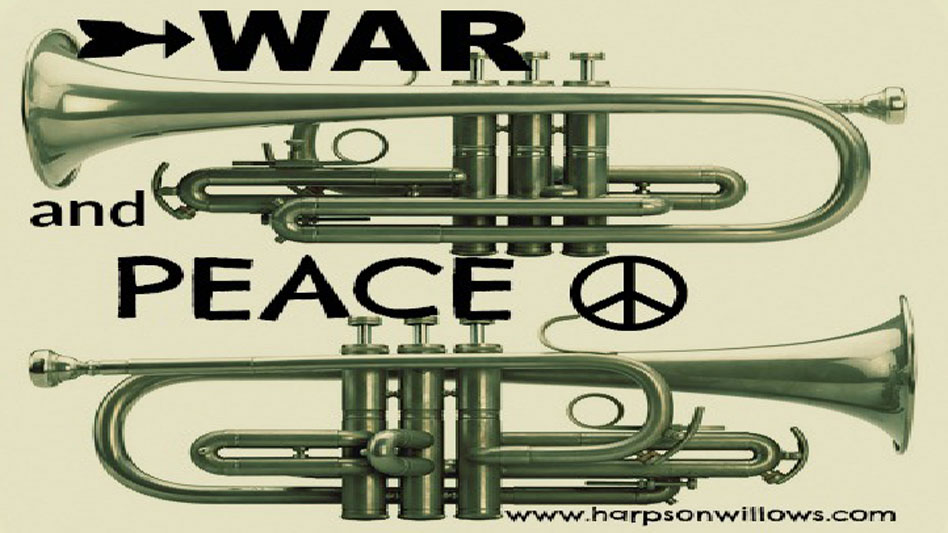And when you go to war in your land against the adversary who oppresses you, then you shall sound an alarm with the trumpets, that you may be remembered before the LORD your God, and you shall be saved from your enemies. (10) On the day of your gladness also, and at your appointed feasts and at the beginnings of your months, you shall blow the trumpets over your burnt offerings and over the sacrifices of your peace offerings. They shall be a reminder of you before your God: I am the LORD your God.” (Numbers 9:9-10)
In War and Peace, Leo Tolstoy aimed to show the novel’s multitude of characters against backgrounds of raging war and relative peace, living and behaving as normally in one as the other. Weaving these lives together in polar circumstances may have been, as one commentator describes, the author’s “personal quest to discover a unifying truth underlying the multiple and seemingly unrelated daily events that make up reality.”
Believing he could discover this common denominator through reason, the author was led to disillusionment and nihilism. The seemingly unrelated and polar realities of experience on earth—war, peace, love, hate, joy, mourning, building up, tearing down, laughter, tears—cannot be explained by human reason. The whole of history is a divine mystery. Whereas nihilism implies disorder and chaos, divine implies order and purpose. The unifying truth—the common denominator—has always been God. And God is found only through faith.
“From one man He created all the nations throughout the whole earth. He decided beforehand when they should rise and fall, and he determined their boundaries. His purpose was for the nations to seek after God and perhaps feel their way toward him and find him—though he is not far from any one of us.” (Acts 17:26-27, NLT)
Commands regarding the use of the silver trumpets in the Promised Land serve as a microcosmic example of divine order in polar opposite experiences. The trumpet sounds were used to direct the minds and hearts of the Hebrew people toward the common denominator in war and peace—and everything in-between—God.
Trumpet alarms sounded in wartime, a time of dread. And trumpet blasts sounded in peacetime, times of worship. Same trumpets. Opposite meanings.
Whether in war or peace, the trumpets served as a tangible reminder of God’s ongoing remembrance of His people. Not that God needed reminding. But the people needed reminding. A trumpet signal indicating war reminded the people that God would protect and deliver. A trumpet signal indicating worship reminded the people of their covenant with God and the peace enjoyed between them.
Those of us in an unfulfilling job situation have our own polar opposite experiences. These too are accompanied by sounds that remind us of workday war and peace. Weekday alarm clocks bring great dread. And great relief and gladness comes from the sound of an end-of-shift alarm, whether that is a second-hand’s click to 5:00 p.m. or a mental rendition of an Alleluia chorus.
For some people, going to work can be a positive experience. This contrasts sharply with the majority of people, who for them, work is like going to war. It is a battle to get up in the morning. To find something to wear. To face the traffic. We want to freely breathe, create, and live. But amid the battle, nothing in us can see the point in spending another day suffocating, having no input, and dying.
Yet we can’t ignore the reality of divine order.
Is it possible to shift our perception of the metaphorical trumpets of alarm clocks and end-of-shift alarms to take on a new role? To allow these sounds to direct our minds and hearts toward God? Whether you are beginning the day and filled with dread, or ending the day and filled with gladness, let the associated sounds become tangible reminders of God’s ongoing remembrance of you. Reminding you that God watches over you 24/7. Reminding you of His ability—and willingness—to help you in any situation. In other words, wholly surrendering each work day to God, the common denominator in all of your experience.
Trust that God will save you from the enemies of hopelessness, depression, boredom, lack of challenge, thoughts of suicide, being somewhere that your heart is not. Take refuge in the fact that “since we have been justified by faith, we have peace with God through our Lord Jesus Christ” (Romans 5:1).
Begin of day or end of day. Dread or gladness. War or peace. Sound the trumpet of remembrance before God. God doesn’t need reminding, but you do.
Prayer:
God, I am overwhelmed by the thought that You are mindful of me 24/7. That you consider me. That you intervene for me. Like David I want to say “what is man that you are mindful of him, and the son of man that you care for him?” I feel so unimportant and without purpose. This job drags me down to the pit. And though I call out to You…, well, I’m still there wasting away. Increase my faith! I am thankful that you watch over me. And God, at the same time You know my distress and anguish. Please rescue me from the oppressive enemies that surround me. And with David I pray “do not delay.” In the Name of Jesus I Pray, Amen.


